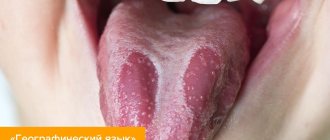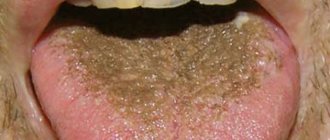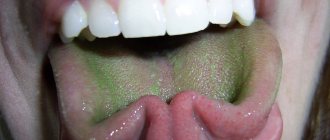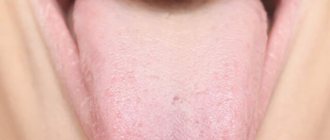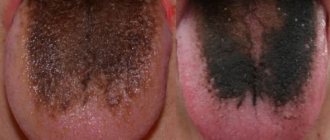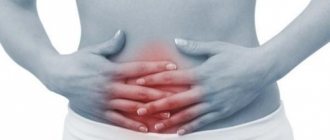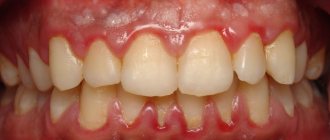Main types of raid
Before you figure out why your tongue is orange, you need to know exactly what types of plaque there are.
Localization differs as follows:
- completely covers the tongue;
- localized at the edges;
- located at the root;
- concentrated in the center;
- accumulates at the tip;
- located under the tongue;
- has one-sided localization.
The type of plaque can be thick, dry, or greasy. Depending on the time of occurrence, such a disorder can be present constantly, it can only occur in the evening, in the morning, it occurs after coloring products or taking certain medications.
By the nature of the plaque, one can accurately judge the presence of certain diseases. In order not to trigger the development of a dangerous pathology, it is imperative to accurately assess the general condition of the surface of the tongue every morning before brushing your teeth.
Main causes
If an orange coating forms on the tongue of an adult or child, this can be caused by consuming vegetables and fruits rich in carotene and brightly colored. After consuming persimmons, carrots, pumpkins, and apricots, there may be an orange tint. Over time, it goes away on its own.
In addition, some medications can provoke a similar problem. It usually goes away after finishing the course of treatment. An orange coating on the tongue can be caused by many disorders in the body; if they are not eliminated in a timely manner, this can lead to serious problems.
What diseases can it be associated with?
An orange coating may form on the tongue due to diseases of the digestive system. This may indicate the presence of pathologies such as:
- gastritis;
- reflux esophagitis;
- pancreatitis.
Gastritis often occurs against the background of poor nutrition and disruption of food intake. The cause of an orange coating on the tongue in an adult is mainly a disorder in the digestive system. This is often accompanied by symptoms such as:
- heaviness in the stomach;
- nausea;
- soreness in the stomach;
- heartburn.
The causes of an orange coating on the tongue can sometimes be associated with the development of pancreatitis. A similar disorder occurs when gland enzymes have a destructive effect during inflammation. As a result of this, a process of self-digestion occurs. Toxic substances and elements can penetrate the systemic bloodstream and provoke disruption of the functioning of important organs.
It is important to recognize the causes of an orange tongue in a timely manner so that comprehensive treatment can be carried out.
Causes
If you have an orange coating on your tongue, there could be many reasons for this. Some are harmless, while others may indicate the possibility of ill health that requires your attention. If you are not sure what could be causing the problem, see your doctor for diagnosis and treatment. So, why might an orange coating appear on the tongue?
Leftover food
According to Dr. Jonathan Richards, an endodontist who answered a question on healthtap.com, “Foods and drinks can turn your tongue orange,” meaning certain medications, foods, or drinks can cause the coloration. If ignored for a long time, it can lead to bad breath.
If the orange coating on the tongue consists of food debris, you need to use a special scraper or brush to remove them. This will also remove bad breath.
Bacteria and fungus
The second possible cause is surface bacteria and/or fungal infection. To find out if this could actually be the cause of the orange coating, it is worth paying attention to other symptoms such as “bad breath and a burning sensation on the tongue” [newhealthguide.org].
For example, the pathogenic fungus Ramichloridium schulzeri appears “golden-orange on Sabouraud agar and brownish-gray on corn agar” [ncbi.nlm.nih.gov] and may be responsible for the golden-orange coating on the tongue.
A simple remedy is to eat yogurt with live bacteria every day for a week to reduce this overgrowth. In addition, you need to clean the surface of your tongue at least twice a day. If symptoms persist, see your doctor for diagnosis and treatment.
Acid reflux (heartburn)
One of the main causes of an orange or white coating on the tongue is acid reflux or heartburn. According to Dr. Oz, “If you notice a white, yellow, or orange plaque, it may indicate acid reflux, which, in severe cases, can lead to esophageal cancer” [doctoroz.com].
Acid reflux occurs when a one-way valve at the bottom of the esophagus opens, allowing acidic stomach contents to move toward the throat and onto the back of the tongue, causing the back of the tongue to turn orange or yellowish-orange.
This often happens at night while sleeping, and the person wakes up in the morning with an orange coating on the tongue. Most people suffering from acid reflux are unaware that they have it.
To control the problem, medications such as omeprazole, antacids (activated carbon, Alka-Seltzer, Maalox or bismuth subsalicylate) are taken. It also requires a change in lifestyle and eating habits, i.e. avoiding sour (oranges, citruses and lemons), spicy or fatty foods, alcohol, garlic, onions, tomatoes, coffee or tea, carbonated drinks, etc. In addition In addition, certain recommendations help: quit smoking, raise your head during sleep, do not lie down immediately after eating (i.e. wait 2-3 hours), eat frequent and nutritious meals, etc.
Taking antibiotics
The use of antibiotics can disrupt the normal natural flora in the mouth and tongue. When this happens, an imbalance of microorganisms is created, which can eventually cause orange plaque to appear.
One user on medhelp.org expressed a similar experience:
“I took Prevpac (lansoprazole) for a few weeks and then Doxycycline soon after to treat my acne. After starting Doxycycline, I began to notice that my tongue would turn orange, usually towards the end of the day” [medhelp.org] - guest866.
To restore the normal balance after using antibiotics, you should take antifungal medications or herbs such as oregano and garlic to eliminate viruses and fungus. You can also try herbal tea containing lemongrass to help restore the microflora in your mouth, as well as taking probiotics twice daily and/or consuming yogurts with live bacteria.
Mold from the environment
Spending time in areas where there is mold can cause an orange coating on the tongue. “Orange tongue may be due to the presence of mold in the environment at home or at work” [newhealthguide.org].
To solve this problem, you need to get rid of mold in your environment, and try home remedies such as gargling or taking grapefruit seeds internally. Antifungal drugs will be ineffective if you do not get rid of the source of the fungus itself.
Other reasons
Other possible causes of an orange coating on the tongue include allergies and oral thrush (thrush).
Bitterness in the mouth and plaque formation
Dryness and slight bitterness in the mouth, which are accompanied by a coating on the tongue, can occur with some diseases. This can be triggered by consuming heavy and fatty foods before bed. This is an additional burden on the liver, and its reaction manifests itself in the form of plaque on the tongue and a bitter taste in the mouth.
A similar problem can arise in case of intoxication of the body. Additionally, headache, severe sweating, nausea and vomiting, as well as increased salivation may occur.
If there are problems with the digestive system, plaque on the tongue may be accompanied by heartburn, belching, and bitterness in the mouth in the morning. If such symptoms occur, you should definitely reconsider your usual diet and adjust your food consumption hours.
In the initial stage of diabetes, the formation of a dense yellow-orange coating on the tongue, bitterness and dryness in the mouth may also be observed. Such symptoms require an immediate visit to an endocrinologist.
During pregnancy, during toxicosis, a coating on the tongue may occur. It is worth reviewing your usual diet and enriching it with healthy foods.
Treatment with antibacterial drugs can lead to the formation of an orange coating on the surface of the tongue. This occurs due to disruption of the normal microflora of the body and the development of dysbacteriosis.
What does the color of plaque indicate?
The color of the mass with which the tongue was coated can tell a lot about the presence in the body of certain problems associated with the functioning of certain organs. This indicator is only relevant if the unnatural color of the tongue is not associated with recent consumption of food or drinks with dyes.
White plaque
A thin film on the tongue, which is colored white, is often found in the morning. It can be easily removed during cleaning and does not cause much discomfort to a person.
A thicker whitish layer portends problems with the immune system. This symptom is a consequence of the active activity of a microorganism that the immune system cannot cope with.
Tight envelopment is a sign of the development of sore throat. If the plaque has a cheesy consistency, then thrush is suspected.
A whitish layer at the base of the organ warns of kidney problems. But the coating of the tip may indicate malfunctions in the respiratory system.
Gray plaque
Gray plaque forms for the same reasons as whitish plaque. Only in this case the pathological processes are more pronounced. A change in the shade of the layer may indicate an advanced form of these diseases.
Also, a gray coating may well be due to taking antibiotics.
Yellow plaque
The yellow color of the mass that covers the tongue indicates damage to the human body by an acute respiratory viral infection, liver problems, disruption of the gastrointestinal tract, or taking medications for too long.
To accurately understand the cause of plaque, it is necessary to assess the presence of associated factors. For example, a bitter taste is another symptom of liver disease, and a high temperature confirms the theory of the development of ARVI.
Sometimes doctors call the onset of jaundice another reason for the formation of a yellowish coating.
Brown plaque
This symptom warns of the appearance of disturbances in the digestive tract. Usually, with a brown coating, a person is bothered by diarrhea and abdominal pain. This type of taxation often occurs in people who are addicted to alcohol.
Orange plaque
The orange color of the mass that coats the tongue is a clear sign that some stomach acid has entered the oral cavity. This disorder is observed with severe exacerbation of gastritis.
Blue Plaque
A bluish coating may be a clear sign of anemia. This condition is diagnosed when there is a lack of iron and folic acid in the body. Blue tongue can be seen in smokers who have had this bad habit for a very long time.
Black plaque
Most people worry about black plaque. The most common cause of the disorder is gastrointestinal diseases. This symptom is also accompanied by severe slagging in the body.
If tooth enamel begins to darken along with your tongue, then a fungal infection is to blame.
Plaque on the tongue in children
If there is an orange coating on the tongue of a baby, it is quite difficult to make an accurate diagnosis. The baby still cannot explain what exactly hurts him. Parents should be very attentive to their children and regularly conduct a comprehensive examination and be sure to pay close attention to the tongue. If plaque appears, you should immediately consult a doctor for diagnosis.
The cause of an orange coating on a child’s tongue can be gastritis, as well as many other pathologies of the gastrointestinal tract. In addition, there may be signs such as diarrhea, vomiting, and abdominal pain. This condition can be triggered by taking antibacterial agents. In this case, a characteristic orange coating appears on the child’s tongue, which goes away on its own over time. However, only a doctor can make the correct diagnosis.
If an orange coating remains on a child’s tongue for a long time, this may indicate the presence of a dangerous disease, for example, reflux disease, the initial stage of an ulcer, and pathology of the esophagus.
Preventive actions
To prevent the appearance of plaque on a child’s tongue, parents should include in his diet foods that ensure the normal functioning of the gastrointestinal tract. It is necessary to ensure that the child regularly and carefully carries out hygienic procedures for caring for the oral cavity. Children under three years old have their teeth brushed by adults; the procedure is carried out 2 times a day. A child over 3 years old who brushes his teeth on his own should be taught to:
- when brushing your teeth, it is necessary to remove plaque from the tongue using a toothbrush or a special scraper, as in the photo;
- After each meal, you should rinse your mouth with a pharmaceutical antiseptic or clean boiled water.
To avoid the appearance of a yellow coating on the tongue of a breastfed baby, the mother must monitor her own menu. For newborns transferred to artificial feeding, you need to choose a suitable mixture that will ensure proper functioning of the gastrointestinal tract. Dr. Komarovsky states that if the mixture is chosen correctly, the baby should not experience constipation.
To avoid infection of the mucous membranes of the oral cavity, it is necessary to carefully clean the baby's dishes, pacifiers and toys.
Carrying out diagnostics
To determine exactly why an orange coating occurs on the tongue of an adult or child, you need to conduct a diagnosis. During the initial examination, the doctor determines the thickness and location of the plaque, motor functions and the relief of this organ. It is very important to determine the presence of concomitant diseases in the oral cavity. Laboratory tests are prescribed, such as:
- general and biochemical blood test;
- sowing on flora from the surface of the tongue;
- analysis for the determination of antibodies to pathogenic microorganisms;
- scatological research.
In addition, instrumental research methods may be required, in particular, ultrasound of internal organs, as well as fibrogastroduodenoscopy.
Treatment for yellow tongue
Before starting treatment, you should understand why the tongue is yellow? To do this, the doctor initially listens to the patient’s complaints, after which, if necessary, he prescribes additional research methods. For example, this is an ultrasound of internal organs, if there is a suspicion of liver and gastrointestinal diseases. After diagnostic procedures, the patient is offered various treatment options. Let's consider treatment options when the coating on the tongue is yellow:
- Diseases of the liver and gall bladder . One of the common causes of jaundice is bile stagnation. To eliminate this condition, the patient is prescribed choleretic drugs and herbal remedies. It is important to start treatment as early as possible, as this can prevent the formation of gallstones. For liver diseases, hepatoprotectors are also prescribed - drugs that have a protective effect on liver cells. If we are talking about viral liver damage, then, if possible, antiviral therapy is carried out (for example, for hepatitis C).
- Infectious diseases . The main treatment for bacterial infections is antibiotics. At the same time, as mentioned above, plaque also occurs while taking antibiotics. In this case, proper recovery of the body after antibiotic therapy is also important. Probiotics and prebiotics, which are prescribed along with antibiotics, will help restore the intestinal microflora. If we are talking about a fungal infection of the oral cavity, then antifungal therapy is prescribed.
- Gastrointestinal diseases . If the cause of plaque is diseases of the gastrointestinal tract, then the patient is prescribed a diet and appropriate medications. Often these are antisecretory drugs used for gastritis and gastric ulcers. The eradication of the bacterium Helicobacter pylori, which is the main cause of chronic gastritis and stomach ulcers, is also carried out.
- Lifestyle correction . If the problem of a yellow coating on the tongue is associated with poor oral hygiene or unhealthy eating behavior, then you can get rid of the symptom by adjusting your lifestyle. Do not forget about oral and tongue hygiene, and also exercise moderation in food. These are the fundamental principles of oral health, including the tongue.
Treatment methods
If the orange coating on the tongue was caused by the consumption of certain coloring products or certain medications, then it goes away on its own, without additional treatment. If such symptoms were provoked by a certain disease, then it is necessary to treat exactly the pathology that provoked it.
To eliminate plaque, the doctor may prescribe medications. In addition, it is recommended to additionally clean the tongue using a special brush designed for this procedure. The plaque must be carefully cleaned off, starting from the very root of the tongue and everything should be done very carefully. You also need to additionally use folk remedies and reconsider your usual diet.
Treatment of orange tongue
Treatment for orange tongue will depend on the diagnosis your doctor gives.
Here is a list of possible treatment options that may be prescribed based on your symptoms and individual diagnosis: »Changes in eating habits or lifestyle, such as adding or removing certain foods, limiting alcohol or tobacco use, drinking water, or other similar changes.
- Adding vitamins or mineral supplements to your daily routine.
- Taking medication to control allergy symptoms, such as nasal sprays, allergy pills, or shots.
- Taking medication to treat an underlying yeast or bacterial overgrowth or fungal problem.
- Taking medication to prevent future episodes of acid reflux or heartburn.
- Taking probiotics or yogurt (or both) to restore a healthy balance of intestinal flora and fauna after using antibiotics.
- Receiving appropriate treatment for a more serious, underlying illness or disease (eg, HIV/AIDS, sexually transmitted diseases, cancer, diabetes, etc.).
Drug therapy
To eliminate the orange coating on the tongue caused by various diseases, the following groups of medications are used:
- pancreatic enzymes;
- choleretic and hepatoprotectors;
- antifungal;
- proton pump blockers;
- antiseptics and antibiotics.
Enzymes are often used to treat pancreatitis. Such drugs help reduce the load on the pancreas. Medicines contain useful enzymes that help break down carbohydrates, fats and proteins. The following drugs are often prescribed: “Creon”, “Mezim”, “Pancreatin”.
Proton pump blockers provoke a decrease in the production of hydrochloric acid, resulting in the restoration of the mucous membrane. Similar medications are used as part of therapy for gastritis. Often Nolpaza, Omez, and Emanera are used for this purpose.
Hepatoprotectors and choleretic agents affect the functioning of the gallbladder, stimulating its work, and also help restore liver cells. Such medicines include Ursofalk and Hofitol. Antifungal agents are used if plaque is caused by thrush. The most effective remedies are Fluconazole and Mycomax.
Antiseptics and antibiotics are mainly used locally. They help eliminate pathogenic microflora and also prevent plaque formation. For treatment, medications such as “Lizobakt”, “Grammidin” are prescribed, as well as rinses, namely “Chlorphyllipt”, “Miramistin”.
To eliminate the orange coating on the tongue and maintain the required level of acid-base balance in the oral cavity, rinses such as Colgate, Listerine, and Fluorodent are used.
What to do
It is very important to discover the cause of such a symptom. Only an experienced specialist, after a preliminary examination, can prescribe therapy. In case of poisoning or infectious processes, antibacterial drugs, antipyretics, and sorbents are prescribed.
To treat gastritis, diet, antispastic drugs, antibacterial agents, antispasmodics, enzymes, and mineral waters are used. The plaque that appears after eating foods with bright pigments goes away on its own after a day. Normally, the film should be cleaned using a scraper or toothbrush. If the plaque does not disappear, it is recommended to consult a doctor.
Chief author and editor-in-chief: Makarskaya S.E., 29 years of experience.
Last revision: 05/20/2017
Folk remedies
Folk remedies are widely used for rinsing the mouth and throat. In addition, they are required to normalize the digestive system. Among the most effective means are:
- anti-inflammatory infusion;
- antimicrobial agent;
- antiseptic decoction.
To prepare an anti-inflammatory infusion, you need to mix mint, oregano, St. John's wort, and lemon balm in equal proportions. Then you need to take 1 tbsp. l. vegetable raw materials, pour 500 ml of boiling water and leave to infuse for 2 hours. Then filter and consume 1 glass of the medicine 2 times a day a quarter of an hour before eating. This healing infusion has a good complex effect on the digestive organs, while eliminating the inflammatory process. The course of therapy is 10 days.
To prepare an antiseptic decoction, you need to take sage and chamomile in equal proportions. Then 2 tbsp. l. The resulting mixture needs to be poured with 400 ml of water and boiled for 15 minutes. Then leave the product to sit for 1 hour and filter. The medicine should be used to rinse the mouth and throat 4 times a day after eating food for 2-3 weeks. The decoction is good for inflammatory throat diseases.
To prepare an antimicrobial infusion you need 1 tbsp. l. oak bark pour 300 ml of boiling water. Leave to infuse for 2 hours, then filter and rinse the mouth 3 times a day, after consuming food for 2 weeks. You need to prepare a new rinse every day.
To eliminate pathogens present in the oral cavity during various inflammatory processes, propolis should be used. You need to chew it every time after eating food for 5-7 minutes.
If you have a yellow-orange coating on your tongue, flax seeds are a good remedy. A decoction of them helps normalize the functioning of the digestive system. It is recommended to take this remedy in the morning on an empty stomach.
Nutrition rules
To eliminate accumulated plaque on the tongue, it is imperative to follow nutritional rules. First of all, it is recommended to avoid products that contain dyes. It is imperative to include in your usual menu products that have a beneficial effect on the functioning of the digestive system.
It is important to exclude:
- spicy dishes;
- fast food;
- semi-finished products;
- fried fatty foods;
- soda.
It is best if your usual diet consists of the following products:
- cereal porridge;
- fresh fruits and vegetables;
- the first people;
- Lenten cookies;
- dairy products;
- pasta;
- jelly.
During treatment, it is imperative to completely avoid alcoholic drinks, as they have an irritating effect on the digestive organs.
Maintaining oral hygiene
There is a close connection between coated tongue and bad breath. The oral cavity is a very favorable environment for the development of various bacteria and microbes. All of them develop in the oral cavity and thereby create orange layers on the surface of the tongue and provoke an unpleasant odor.
It is imperative to clean this organ daily in the morning and evening, along with brushing your teeth. After each meal you need to rinse your mouth thoroughly. To do this, you can use prepared decoctions of medicinal herbs, for example:
- sage;
- chamomile;
- mint;
- oak bark
These plants help make your breath fresh, strengthen your gums, and also cleanse your tonsils of existing plaque. It is advisable to use special refreshing mouth rinses.
It is best to choose a toothpaste with an antibacterial effect. If you need to instantly get rid of plaque on your tongue, you can use special lozenges or aerosols for the oral cavity.
Causes of orange tongue
When the word "orange" is used for medical purposes, it can actually mean any color in the orange spectrum, which can actually range from very light orange or even "burnt yellow" to a brown or dark orange hue.
In fact, there are a number of possible reasons that could explain why your tongue suddenly looks orange.
Here are some of the most well-known reasons why this can happen:
Acid reflux
Statistically, up to 60 percent of all people will struggle with some level of acid reflux at some point in their lives.
The full name for acid reflux is GERD (gastroesophageal reflux), and it is sometimes simply called “heartburn.” Acid reflux is diagnosed when acids from the stomach and digestive tract return to the mouth. This is what makes the tongue look orange.
Excessive yeast growth
Yeast overgrowth is most commonly known as Candida, but there are actually several forms of yeast that can cause your tongue to turn orange.
According to a report by US News Wellness, up to three-quarters of all women will have a vaginal yeast infection during their lifetime. Yeast overgrowth can also affect men and children. Babies, in particular, are prone to suffer from yeast burns (called thrush).
Use of antibiotics
Some antibiotics are known to cause yeast imbalances, especially in oral tissues. When you take antibiotics that have this side effect, you may see your tongue turn orange.
Overgrowth of bacteria or fungi
Certain strains of bacteria and fungi can turn the tongue and/or mouth tissue orange when they begin to grow inside the mouth.
One example is Ramichloridium schulzeri (Golden Tongue syndrome). If you are battling a yeast infection that has not yet been diagnosed, you may see orange spots on your tongue.
While it may be more difficult to diagnose if you work or live in a space that has been infested with mold or mold spores, it can also affect your body and tongue. One of the first signs that mold is affecting you may be when your tongue turns orange.
Allergies
For some people, allergic reactions to certain pollens, molds, or chemicals can cause an orange tint to the tongue. For others, food allergies can cause the tongue to turn orange.
Vitamin deficiency
Every person's vegetable basket should be varied! Statistically, if your body is deficient in certain vitamins (B vitamins and folate are good examples), the deficiency can turn your tongue orange. Consult your doctor to choose the best vitamins for you.
Eating too much of certain foods
The University of Arkansas for Medical Sciences reports that eating too much of certain foods can cause your skin, as well as your mouth or tongue, to turn orange.
One of the main culprits here, of course, is carrots. It's so common and the culprit is carotene.
Another slightly lesser-known culprit that can turn your skin and tongue yellowish-orange is tomatoes. This condition is called lycopenia.
In fact, any food that is too high in the antioxidant pigment beta-carotene can cause yellowing or orange discoloration of the tissues of the skin and mouth.
Prognosis and complications
With timely treatment, the prognosis is always favorable. If the disease that provoked the formation of plaque on the tongue is neglected, it can lead to quite dangerous consequences.
For example:
- cirrhosis of the liver;
- the transition of gastritis to an ulcer with the subsequent appearance of a malignant tumor;
- bowel cancer;
- formation of ulcerative colitis.
In the presence of very advanced caries, which often leads to plaque with a bad odor, the formation of pulpitis is possible. In this case, you should definitely visit a dentist for diagnosis and subsequent treatment.
Carrying out prevention
To prevent the formation of plaque on the tongue, you need to follow certain preventive measures:
- regular brushing of teeth and tongue;
- competent use of antibacterial agents;
- After each consumption of food, the mouth should be rinsed with water;
- promptly treat diseases of the digestive system;
- try to avoid stress.
In order to prevent the formation of plaque on the tongue, you need to regularly undergo a comprehensive examination, as this will allow you to promptly recognize the course of the disease. This is the only way to maintain health, because prevention is much easier than treatment.
Child examination
The examination of the baby begins with a consultation with specialists. Sometimes a visit to the dentist is enough to eliminate the cause of tongue staining. Even minor changes in a child’s diet contribute to the disappearance of an aesthetic defect.
As a rule, one external examination of the patient is not enough to identify the cause of the pathology, even if the consultation is carried out by an experienced specialist. A change in the structure of the tongue is one of the first signs of developing internal pathologies. At this stage, the disease may be asymptomatic. It is especially difficult to diagnose pathology in infants, since they cannot talk about their health. In this regard, the specialist conducts a comprehensive examination of the small patient in order to exclude malfunctions from various systems and organs. It includes:
- general analysis of blood, urine and feces;
- a blood test to detect bilirubin levels to assess liver function;
- Ultrasound of the abdominal cavity;
- esophagogastroduodenoscopy.
Esophagogastroduodenoscopy is recommended for children with suspected benign and malignant formations in the digestive system
The child does not have to undergo all of the above procedures. In each case, the specialist determines the need for certain measures depending on the clinical picture of the disease and the age of the patient.
